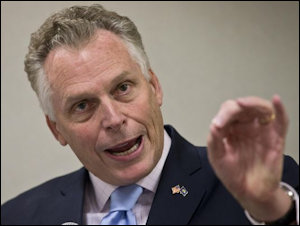 I have to agree with Governor Terry McAuliffe on this one: The General Assembly should put $121.5 million from the FY 2017 budget surplus into a newly created financial reserve. Moreover, I find his logic impeccable:
I have to agree with Governor Terry McAuliffe on this one: The General Assembly should put $121.5 million from the FY 2017 budget surplus into a newly created financial reserve. Moreover, I find his logic impeccable:
“Given the level of federal and economic uncertainty, I would suggest to each or you that any effort to build up liquidity and cash reserves is a wise course of action,” McAuliffe said while addressing General Assembly money committees yesterday.
Right on!
The Commonwealth ran a $136.6 million budget surplus last fiscal year. After making mandatory deposits in special funds, such as one to help localities make water quality improvements, the state has $121. 5 million left over to do with as legislators please, reports the Richmond Times-Dispatch. It’s not easy for a politician to resist spending the money, but McAuliffe’s instincts are absolutely correct.
The governor’s advice comes against a backdrop of increasing concern about Virginia’s ability to maintain its AAA bond rating. In April Standard and Poors downgraded the state’s financial outlook from stable to negative due to uncertainty over federal spending and the drawing down of the state’s Revenue Stabilization Fund to balance the budget the past two years. The legislators who created the so-called Rainy Day fund visualized tapping the reserve in years when revenues actually declined, not merely when they increased below expectations. The details are not clear from press accounts, but the new reserve apparently is distinct from the Rainy Day fund.
The governor is not likely to get any push-back from legislators. “We’re on the same page as far as all excess revenue going into the revenue reserve fund,” said House Appropriations Chairman Chris S. Jones, R-Suffolk, after the governor’s speech.
Virginia faces a future of chronic fiscal stress and economic uncertainty. Medicaid spending will continue to gobble an increasing share of state spending. The state does not meet its own standards for providing support to K-12 education, it has fallen behind in support for higher education, and it still faces massive unfunded pension liabilities. Meanwhile, the economy is stuck in slow-growth mode, providing little basis for thinking that a surge in tax revenue will bring in a miraculous gusher of cash.
Long-term, Virginia needs to re-think how it delivers and pays for core services such as transportation, infrastructure, health care, and education. There is no indication that either the governor or the legislature has ambitions to do more than tinker at the margins of institutional reform. Accordingly, the only alternative is to adopt an ultra-cautious approach to budgeting: Build up the rainy-day fund, add to the newly created financial reserve, accelerate payments to the Virginia Retirement System, and halt the budgetary gimmickry.


